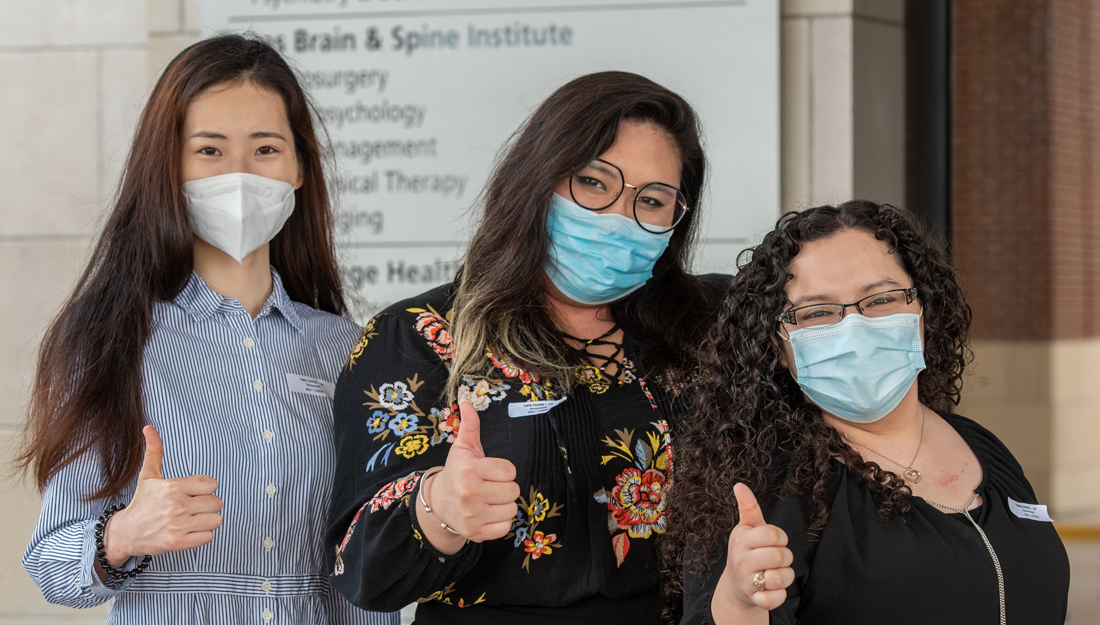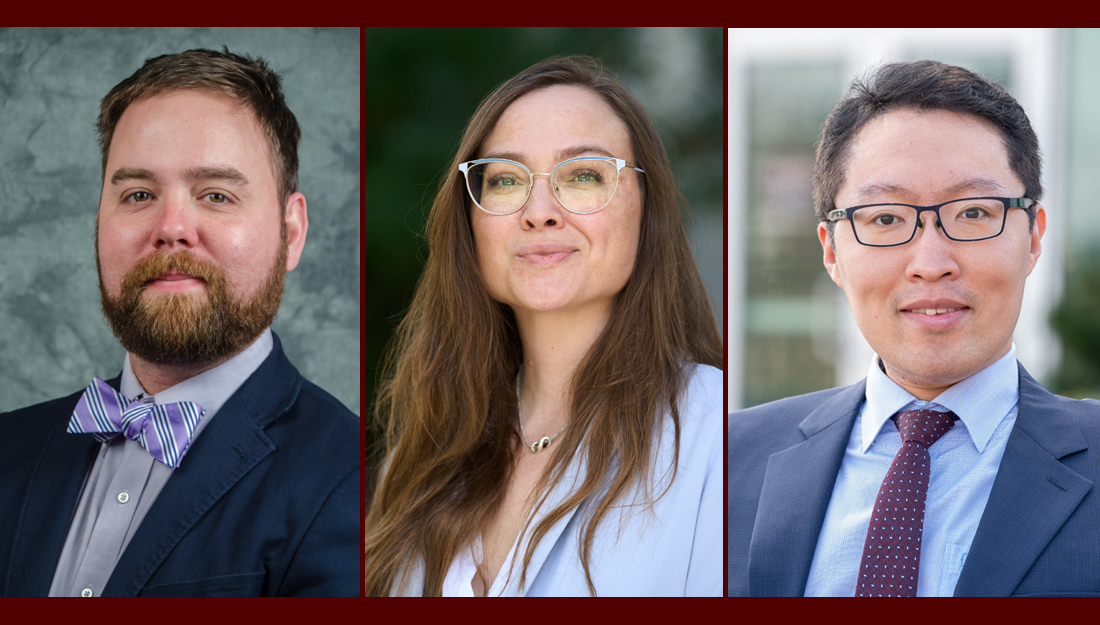- Rae Lynn Mitchell
- COVID-19, Public Health, Show on VR homepage
Bringing the Aggie spirit to Austin: Aggies help Texas officials better understand COVID-19 data
Three public health students dedicated five weeks to making ‘a real difference’ for the state of Texas

Pictured left to right: Qiping Fan, Fabiola Sanchez, Julia Bai
As Fabiola Sanchez, Julia Bai and Qiping Fan read the email they just received from Angela Clendenin, PhD, instructional assistant professor at the Texas A&M University School of Public Health, they knew that hitting “reply” would give them the opportunity of a lifetime.
Clendenin was recruiting students interested in dedicating a few weeks to helping the Texas Department of State Health Services (DSHS) in Austin on COVID-19-related work. Specifically, the students would be assisting the Vulnerable Population Task Force in gathering and analyzing data on populations most vulnerable to COVID-19, such as individuals in nursing homes and incarceration facilities.
Sanchez and Bai, who graduated in May 2020 with their Master of Public Health in epidemiology, immediately jumped on the opportunity.
“I have always been interested in working with vulnerable populations affected by infectious diseases,” Sanchez said. “I couldn’t pass up the opportunity of interning with a unit that works explicitly with vulnerable populations that are afflicted by COVID-19.”
As a recent graduate, Bai felt equipped with knowledge that she knew would be a resource for DSHS.
“We really wanted to experience doing anything we possibly could to help with the situation,” Bai said.
For Fan, a first-year doctoral student with a strong epidemiology background, the opportunity to assist DSHS was more personal. Fan was born in the Hubei Province in China, which is home to the city of Wuhan, the original epicenter of COVID-19.
“My family and friends in Hubei were severely impacted by the COVID-19 outbreak,” Fan explained. “I witnessed the disease spreading all over the world, starting from an unknown-virus report, to all the unprecedented changes happening right now. I wanted to find a way to contribute as a public health professional, and then suddenly the opportunity came.”
The chance for these three Texas A&M students to gain real-world public health experience stemmed from relationships Clendenin had formed with individuals at DSHS.
“For DSHS to reach out and request our students to come help them with a significant public health problem is very indicative of the relationship our school has with them,” Clendenin said. “I think this speaks volumes about the caliber of our students and the quality of education we’re providing them.”
For the first three weeks, the students physically distanced and worked day in and day out from their hotel rooms on a variety of tasks given to them by DSHS. Between virtual team meetings with DSHS workers, the students updated line lists (a detailed record of outbreak investigations), revised the Centers for Disease Control and Prevention’s COVID-19 safety guidelines to accommodate for specific vulnerable population facilities in Texas, and even helped improve data collection strategies for more accurate reports of Texas’ COVID-19 cases. The students also focused on making data easy to understand for the media and easy to visualize for other epidemiologists and DSHS staff so they could make important health decisions for the state of Texas.
Data constantly needed to be updated, so work days lasted from early morning to late at night. All three students agreed it was hard work, but they are grateful for every minute of it.
“I had the joy of witnessing true public health at work when deadlines and objectives have a serious consequence on daily lives,” Bai said.
“We got to see how something as small as a spreadsheet is important,” Sanchez said. “They are key to maintaining and providing great products, like dashboards, that visually show how the pandemic is affecting Texas.”
“The students literally worked all day every day,” Clendenin said. “They had a lot of work they were expected to do just as if they had been a public health professional for a number of years. They also had the right personalities for this. People are scared, people are frustrated, and people are under a lot of pressure trying to contain COVID-19. All three of the students had very polite, easy-going, professional demeanors.”
However, sending the students to Austin required funding; and in a time of uncertain budgetary constraints, financial support could be hard to come by. Yet, the School of Public Health administration was supportive.
“It was amazing to me how certain faculty members came together to find enough funds to support the students for three weeks,” Clendenin said. “In fact, the students did such a fantastic job that Dr. Peter Pendergrass, the director of the Vulnerable Populations Task Force, asked if their work could be extended for another two weeks. Their work had been stellar and they made incredibly valuable contributions.”
“It was clear that Texas A&M had prepared them well for a career in public health,” Pendergrass said.
Finding the funds for the students to work another two weeks in Austin initially worried Clendenin, but the School of Public Health administration came through once again with an overwhelming amount of support. Within two hours and through a flurry of emails from Texas A&M faculty, the funds for the students to continue working were secured.
“I got really emotional about it,” Clendenin said. “It really hit me why I’m doing what I’m doing and why the students matter to me. To be able to work in an environment with people whose focus is on the students and making them the very best public health professionals they can be, is overwhelming.”
Without a doubt, the spring 2020 semester was anything but traditional. Many Texas A&M traditions, including spring graduation, were cancelled due to COVID-19. Bai and Sanchez may have missed out on walking on the stage, but for both graduates, the end of their degree program at Texas A&M will remain memorable through their service with DSHS.
“For me, as an epidemiologist, this opportunity meant a lot since we are graduating into a pandemic—a situation that we haven’t faced in a really long time,” Sanchez said. “We are class of 2020, but we are also class of COVID-19. We understand as public health professionals that we have a responsibility to help. I am extremely grateful to my professor for choosing us for this opportunity. Not a lot of people get this experience and I am really happy to be a part of something so great.”
Although COVID-19 has caused much uncertainty lately, Texas A&M students continue to lead by example and are fearless on every front. Fan, Sanchez and Bai have inspired many people to persevere through difficult times, including Clendenin, who all three students admire.
“To be able to see the students embody the Aggie core value of selfless service and excellence makes me a proud faculty member and Aggie,” Clendenin said. “These students made a real difference for the state of Texas.”
– by Callie Rainosek
Media contact: media@tamu.edu


